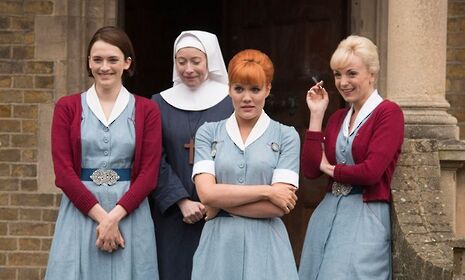TV Round-Up: Call the Midwife (Part 1)
The Sunday favourite is still twee, still saccharine, and still charming, says Jemma Slingo

Call the Midwife does strange things to a person. I sit down at 19.55 on Sunday evening as a balanced human being. My brain contains a healthy level of cynicism. My nerves tingle with a familiar sense of irritation. Four pregnant women, eight doses of gas-and-air, and several babies later, however, and something’s changed. The world gives off a golden glow. I have moved into a squeakily wholesome universe, where everyone is alarmingly earnest and handicraft is a legitimate pastime. What’s more, I am loving it.
We are into season six of the BBC’s Sunday night drama, based on the memoirs of Jennifer Worth, a midwife who worked in the East End during the late 1950s. If anything, the programme is twee-er than ever. Episode one reached fever pitch when Nurse Gilbert’s pottery demonstration went awry. Sister Ursula, meanwhile, sparked outrage in episode two, after confiscating Sister Monica-Joan’s packet of bon-bons.
Ultimately, the programme appeals to two, very different, audiences
It’s not the case, however, that Call the Midwife is devoid of social grit. The latest episodes have dealt with domestic violence, disability and mental illness. Nor is it always the case that tragedies are avoided. Episode two ended with a character facing a life of blindness, barred from ever looking at his newborn son. Meanwhile, episode one explored the bleak prospects that faced women fleeing from abusive husbands in the 1950s. However, there is always an underlying, irrepressible sense of optimism. In a gentle way – usually involving rich tea biscuits and dubious knitwear – the residents of Nonnatus House champion liberal values. Indeed, this is perhaps the key to Call the Midwife’s success. Enlightened, modern attitudes reside in a cosily retro setting. We are allowed to have our cake and eat it.
The programme’s premature liberality, however, is offset by the BBC’s own, bizarrely prudish, disposition. Over the last two seasons, romance has blossomed between Patsy, the midwife, and Delia, the paramedic. Although happy to show the worst birth scenes since John Hurt’s ribcage exploded in Alien, however, the BBC are still too squeamish to show two women kissing. Without exception, the camera turns away – red faced – from anything beyond a sly hand-hold.
This spotlights a fault line in Call the Midwife’s apparently faultless model. Ultimately, the programme appeals to two, very different, audiences. A liberal-minded set of (often younger) viewers is counterbalanced by a stuffier audience, all too willing to be scandalised. Reluctant to throw the baby out with the bathwater, the BBC plays it safe. However, in doing so, it never fully pleases anybody. As the credits roll at 9 o’clock, a niggling sense of cynicism and irritation has returned.
 News / Cambridge bus strikes continue into new year16 January 2026
News / Cambridge bus strikes continue into new year16 January 2026 News / Uni members slam ‘totalitarian’ recommendation to stop vet course 15 January 2026
News / Uni members slam ‘totalitarian’ recommendation to stop vet course 15 January 2026 Science / Why smart students keep failing to quit smoking15 January 2026
Science / Why smart students keep failing to quit smoking15 January 2026 Interviews / The Cambridge Cupid: what’s the secret to a great date?14 January 2026
Interviews / The Cambridge Cupid: what’s the secret to a great date?14 January 2026 News / Cambridge local elections to go ahead in May despite local government reorganisation16 January 2026
News / Cambridge local elections to go ahead in May despite local government reorganisation16 January 2026








